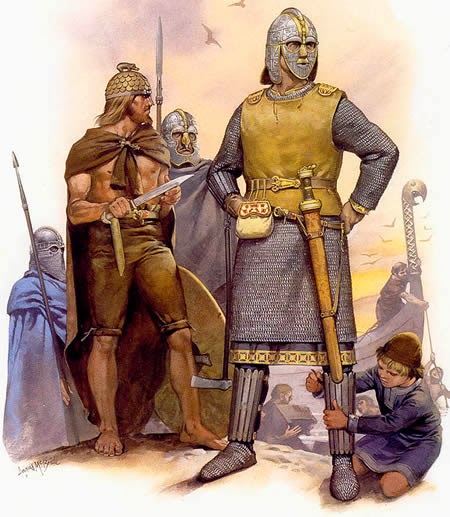Imagine a world without modern technology, a world where the sun and moon dictated the rhythms of life, and where stories were passed down through generations by word of mouth. This was the world of the Anglo-Saxons, a vibrant and complex culture that shaped the foundations of England and left an indelible mark on our language, literature, and society.

Image: www.renegadetribune.com
The Anglo-Saxons, a collective term encompassing a group of Germanic tribes, migrated to Britain in the 5th century AD, following the withdrawal of Roman legions. They established kingdoms across the land, laying the groundwork for a unique cultural identity. Understanding the culture of the Anglo-Saxons offers a glimpse into the lives of our ancestors, their beliefs, values, and practices, which continue to resonate in our world today.
From Paganism to Christianity: The Evolution of Anglo-Saxon Religion
The Anglo-Saxons arrived in Britain with a rich pagan heritage, worshipping a pantheon of gods and goddesses associated with nature and the elements. Woden, Thor, and Freya, figures familiar to those acquainted with Norse mythology, were powerful deities in Anglo-Saxon belief systems. Their rituals were often held outdoors, with sacrifices made to appease these divine beings, seeking their favor in matters of war, fertility, and the bounty of the land.
The arrival of Christianity in the 7th century AD marked a significant turning point in Anglo-Saxon culture. The influence of the Roman Church spread across the land, gradually transforming religious traditions. Churches were built, and monasteries became centers of learning and literacy. While pagan practices lingered for a time, Christianity eventually took root, shaping the ethical and spiritual framework of Anglo-Saxon society.
From Mead Halls to Battlefields: The Social Structure of Anglo-Saxon Society
Anglo-Saxon society was a hierarchical one, with a king at the apex, surrounded by a network of nobles, warriors, and freemen. The king was the chief warrior and leader, responsible for maintaining peace and justice within the realm. The Anglo-Saxon ideal of kingship emphasized courage, strength, and righteousness, traits valued in a world where warfare was a constant threat.
The social fabric of Anglo-Saxon communities revolved around the concept of “comitatus,” a bond of loyalty and oath between a lord and his warriors. This system cemented military strength and political alliances, as warriors swore oaths to defend their lord and his interests. The mead hall, a magnificent building serving as a central gathering place, served as the heart of Anglo-Saxon society. Here, feasts, celebrations, and storytelling took place, fostering a sense of unity and community among members of the “comitatus.“
Poetry and Prose: The Written Word in Anglo-Saxon Culture
Anglo-Saxon culture flourished in storytelling, expressing itself through the vibrant traditions of poetry and prose. The epic poem Beowulf, a masterpiece of Anglo-Saxon literature, is a testament to the power of language to capture heroism, sacrifice, and the timeless battle between good and evil. The poem tells the story of Beowulf, a warrior who battles a fearsome monster, Grendel, to protect the Danish king Hrothgar and his people.
Beowulf showcases the hallmarks of Anglo-Saxon poetry – its use of alliteration, strong rhythm, and kennings, metaphorical phrases used to describe people, places, and objects. Anglo-Saxon poetry is known for its evocative imagery, capturing the beauty of the natural world, the ferocity of battle, and the enduring bonds of loyalty and love.

Image: childhealthpolicy.vumc.org
The Legacy of the Anglo-Saxons: A Lasting Influence
The legacy of the Anglo-Saxons echoes through the centuries, shaping our language, literature, and institutions. The English language, with its grammatical structure and vocabulary, owes a significant debt to the Anglo-Saxon tongue. Words like “morning,” “love,” “friend,” and “gift” still retain their ancient Anglo-Saxon roots, linking us directly to our linguistic heritage.
The influence of Anglo-Saxon literature continues to resonate in modern works. Epic poems such as Beowulf have inspired countless adaptations and reinterpretations, demonstrating the enduring power of these tales to capture our imaginations. The values of courage, justice, and loyalty, core tenets of Anglo-Saxon society, continue to be cherished in contemporary culture, reminding us of the enduring principles upon which our society is built.
Culture Of The Anglo Saxons
Conclusion: The Enduring Relevance of the Anglo-Saxons
The culture of the Anglo-Saxons, from their pagan beliefs and society’s structure to their poetic achievements, offers a profound window into our past. It allows us to appreciate the foundations upon which we stand, the values that continue to shape us today. Their story is a reminder that every civilization is a bridge connecting past, present, and future. By understanding their cultural legacy, we can gain a deeper appreciation for our own place in the ongoing tapestry of human history. Continue your journey by exploring ancient manuscripts, visiting Anglo-Saxon sites, or delving into the rich and vibrant world of Anglo-Saxon poetry. Let the echoes of the past guide you towards a greater understanding of our shared cultural heritage.






